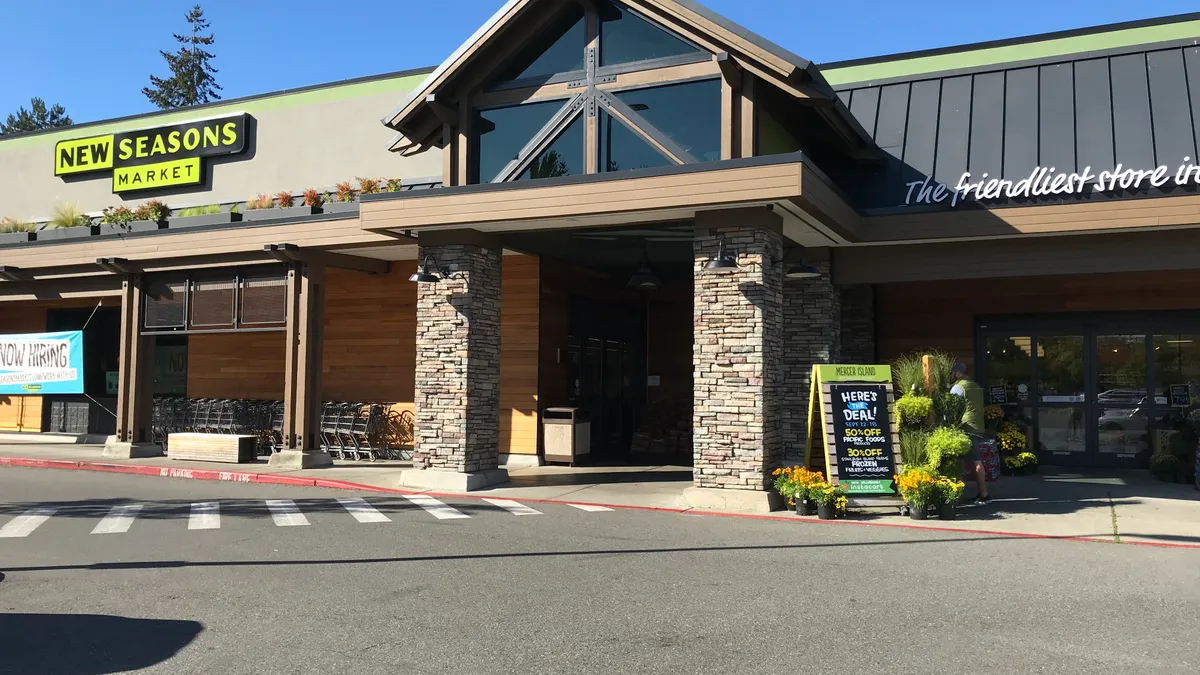Dive Brief:
- New Seasons Market, a natural and organic grocer based in Portland, Oregon, announced a new executive structure, the company said in a press release. Co-president Forrest Hoffmaster will take on the role of chief executive officer, and co-president Kristi McFarland will move into the role of chief strategy officer. The shift will support the company’s continued growth after significant investments and changes last year.
- Hoffmaster joined New Seasons Market in 2016 as chief financial officer. He has played a significant role during his tenure in establishing partnerships, advancing sustainable business practices and overseeing business development and operations. McFarland began her career at New Seasons in 2014 as chief people officer. During her tenure, she helped the company strengthen brand engagement and community relations.
- “We have passionate and dedicated staff and an incredible purpose-driven leadership team committed to the long-term health of our organization, staying true to our founder-inspired values and being a leader in the industry," Hoffmaster said in a statement. "Our team is structured to bring these priorities to life.”
Dive Insight:
New Seasons’ leadership change signifies a new direction for the company, which experienced some challenges during the past year. The company saw former CEO Wendy Collie step down in early 2018 while pulling back on expansion plans in California where it operates the New Leaf Community Markets banner. At the time, company leadership said this would allow the grocer to strengthen its core stores and local community connection during a tumultuous time in the grocery industry.
McFarland and Hoffmaster were named co-presidents after last year’s shakeup, which was intended to flatten the New Seasons organization and create a team-based structure. After testing that out for a year, it appears New Seasons is returning to a more traditional hierarchy. This could be in response to the increased competition natural grocers are facing from the tie-up of Amazon-Whole Foods, which may call for stronger leadership and executive involvement to remain competitive and quickly implement strategy.
One of the most notable issues for the company has been its start-and-stop growth pattern. Collie grew the company to 25 stores, but then saw it drop to 19 when she departed. Now, the company has grown to 21 New Seasons locations and four New Leaf Community Markets. Currently, the company's website shows one new location coming soon in Seattle’s Central District neighborhood, but there has not been any additional discussion around plans for growth.
New Seasons also has faced scrutiny under Collie for unfair labor practices, including cutting back employee health care and attempts to quell unionization. With Hoffmaster and McFarland at the helm, it appears the company is making a number of improvements, including a deeper commitment to local partnerships and sourcing, improving relationships with both employees and customers, and establishing more progressive, sustainable business practices.
In December, New Seasons announced pay raises to $15 an hour for staff across California, Washington and Oregon. It's currently offering a discount to any furloughed and unpaid federal employee affected by the government shutdown. The company also recently partnered with a new customer relationship management provider to deliver a more personalized shopping experience.
Ultimately, New Seasons appears to be rebounding from many of its own stumbles while also trying to differentiate itself from similar formats used by grocers such as Sprouts and Natural Grocers. At the same time, it still has the tall task of remaining competitive with Whole Foods and other larger, local grocers that have a more robust presence.













